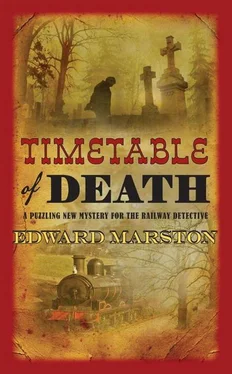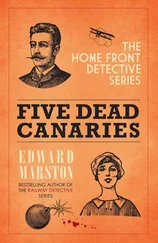Edward Marston - Timetable of Death
Здесь есть возможность читать онлайн «Edward Marston - Timetable of Death» весь текст электронной книги совершенно бесплатно (целиком полную версию без сокращений). В некоторых случаях можно слушать аудио, скачать через торрент в формате fb2 и присутствует краткое содержание. Год выпуска: 2015, ISBN: 2015, Издательство: ALLISON & BUSBY, Жанр: Исторический детектив, на английском языке. Описание произведения, (предисловие) а так же отзывы посетителей доступны на портале библиотеки ЛибКат.
- Название:Timetable of Death
- Автор:
- Издательство:ALLISON & BUSBY
- Жанр:
- Год:2015
- ISBN:9780749018122
- Рейтинг книги:4 / 5. Голосов: 1
-
Избранное:Добавить в избранное
- Отзывы:
-
Ваша оценка:
- 80
- 1
- 2
- 3
- 4
- 5
Timetable of Death: краткое содержание, описание и аннотация
Предлагаем к чтению аннотацию, описание, краткое содержание или предисловие (зависит от того, что написал сам автор книги «Timetable of Death»). Если вы не нашли необходимую информацию о книге — напишите в комментариях, мы постараемся отыскать её.
Timetable of Death — читать онлайн бесплатно полную книгу (весь текст) целиком
Ниже представлен текст книги, разбитый по страницам. Система сохранения места последней прочитанной страницы, позволяет с удобством читать онлайн бесплатно книгу «Timetable of Death», без необходимости каждый раз заново искать на чём Вы остановились. Поставьте закладку, и сможете в любой момент перейти на страницу, на которой закончили чтение.
Интервал:
Закладка:
Instead of being unable to touch his food, Leeming ate heartily and left the senior officers to do most of the talking. All three of them found the lamb and mint sauce to their taste. Tallis dabbed at his mouth with a napkin to remove the specks of gravy from his moustache.
‘How would you summarise this case, Colbeck?’
‘I’d do so in two words, sir.’
‘And what might they be?’
‘Confusion and error,’ muttered Leeming.
Colbeck smiled. ‘We’ve encountered both since we’ve been here,’ he agreed, ‘but I had two different words in mind — coal and silk.’
‘Explain,’ said Tallis.
‘The products define the battle for the chairmanship of the Midland Railway, sir. Mr Quayle made his fortune out of coal while Mr Haygarth lives in luxury on the profits of his silk mills. Coal is hard while silk is soft. In some ways,’ argued Colbeck, ‘they help to characterise the two men. We never knew Mr Quayle but we met his elder son who’s been likened to him in every way.’ He turned to Leeming. ‘How would you describe Stanley Quayle?’
‘Cold and hard.’
‘Just like a piece of coal. What about Mr Haygarth?’
‘Smooth and snake-like.’
‘Just like a bolster of silk.’
‘I’m trying hard to follow your reasoning,’ complained Tallis.
‘It’s quite simple, sir,’ said Colbeck. ‘The one has ousted the other. From what we can gather, Mr Quayle was a natural leader, respected, strong-willed and resilient in the face of the many difficulties that have afflicted this railway company. He’s been supplanted by a more subtle, guileful and sinister rival.’
‘Are you saying that Mr Haygarth is behind the murder?’
‘He’s the one who stands to gain most out of it, sir.’
‘Then why insist on calling on you to lead the investigation?’
‘He wants to gain kudos by appearing to make every effort to solve this crime while confident that a solution is beyond me.’
‘I still think that Hockaday had a part in it,’ asserted Leeming. ‘He’s not clever enough to set the whole thing up by himself but he’d be a willing helper if there was money in it. That brings us back to the person best placed to employ the cobbler to do his dirty work for him — Superintendent Wigg.’
‘That’s a ludicrous suggestion,’ said Tallis.
‘We’ve met corrupt policemen before, sir.’
‘You hardly need to tell me that, Leeming. I’ve had to dismiss too many of them. Inspector Alban Kee was an example. I’ll have no fraudsters or bribe-takers under my command. Now, I’ve never met this Superintendent Wigg,’ he went on, ‘but I find it hard to believe that anyone in his position would condone — let alone, incite — murder. Haygarth stands to gain from the death but Wigg was bound to lose. He’d merely be replacing one person he loathed by another. What’s the point of that?’
‘The superintendent’s brother is a pharmacist, sir,’ Leeming reminded him.
‘That’s an irrelevance.’
‘I don’t think so.’
‘Then you must learn to focus your mind, Sergeant.’
Tallis went on to give a searching analysis of the evidence so far gathered and showed that he’d been listening very carefully. While conceding that Haygarth had to be a major suspect, his instinct was that a much younger man was involved.
‘Gerard Burns is the most likely killer,’ he concluded.
‘I thought that until I met him,’ said Colbeck.
‘What changed your mind?’
‘I tried to look at him from the point of view of his employers, sir. He was well paid and given an important job by Mr Quayle. Burns clearly did it very well. It was only when he strayed away from it that the trouble started.’
‘He suffered physical injury on Quayle’s orders. An urge for revenge must still burn inside him.’
‘It does, Superintendent, and he won’t gainsay that. But think of the man who indirectly pays his wages now. Every servant and gardener at Melbourne Hall would have been subjected to rigorous scrutiny before they were taken on. Rare as his visits to Derbyshire are, the prime minister would not want potential killers among his staff. In essence,’ said Colbeck, ‘Burns is an excellent gardener so committed to his trade that he doesn’t have the time or the inclination to avenge an old slight.’
‘It was much more than a slight,’ said Tallis. ‘My money is on him.’
‘We know that Burns was in Derby on the night of the murder,’ added Leeming. ‘Why won’t he tell you where he went?’
‘Perhaps I should have a word with him.’
‘No, no, sir,’ said Colbeck, hastily, ‘that would be unwise. If Gerard Burns is our man — and I’m not convinced of that — we should leave him alone and let him think he’s got away with it. If he really is the killer, we’ll amass the evidence that will put a noose around his neck. However, I still think him innocent.’
‘You prefer to see him in terms of his work,’ said Tallis, ‘and choose to forget the scandal he caused at the Quayle household. In my opinion, that’s a more accurate reflection of his character. He’s sly, deceitful and a practised libertine.’
‘What he was drawn into was a genuine romance, sir.’
‘Burns has no moral compass.’
‘Miss Quayle doesn’t believe that, sir,’ recalled Leeming. ‘She loved him for his good qualities. I told you how well she spoke of him.’
‘The fellow was bent on deflowering her.’
An awkward pause ensured. When he realised that he was talking about a gardener, Tallis was embarrassed that he’d chosen that particular word. Colbeck and Leeming traded a glance but said nothing, all too conscious that romance had passed the superintendent by. Tallis neither understood nor approved of relations between the two sexes. If the subject came up, therefore, it was better to let him rehearse his prejudices without challenging them.
‘Where do we go from here?’ he asked.
‘There’s a rather tempting dessert menu in front of you,’ Colbeck pointed out.
‘I’m asking whom you will question tomorrow.’
‘Well, I’m going to see that pharmacist in Belper,’ said Leeming.
‘Save yourself the trouble. Colbeck?’
‘I plan to visit the Quayle family again, sir.’
‘Good,’ said Tallis. ‘I’ll come with you.’
Colbeck sighed. ‘Oh, I wouldn’t impose on you, sir.’
‘Never spurn the assistance of your superior. Besides, a second opinion is always wise.’ He stroked his moustache. ‘Now pass that menu and I’ll see if it contains anything to tempt my palate.’
Jed Hockaday was a different man in uniform. He looked bigger, broader and more upright. His swagger became more pronounced. Having finished work at his shop, he’d closed it up, eaten a frugal meal then stepped out into the streets of Spondon as a police constable. His footsteps took him in the direction of the railway station. Long before he reached it, he heard the train that he was supposed to meet arriving with its customary pandemonium. The cobbler soon saw a uniformed figure leaving the station amid a knot of other passengers. He waited until Elijah Wigg reached him.
‘I expected you on the station platform,’ said Wigg.
‘I’m sorry, sir. I was late closing up.’
‘Punctuality matters. It’s a mark of respect.’
‘It won’t happen again, Superintendent.’
Wigg fell in beside him and they walked back towards the village.
‘What do you have to report?’
‘They’ve found nothing.’
‘Are they still burrowing away?’
‘Yes,’ said Hockaday, ‘but it won’t do them any good.’
‘I hope that’s the case, Constable.’
‘It is, sir. What I don’t see with my own eyes, other people tell me about. They’ve both been here — Inspector Colbeck and the sergeant — but they don’t know where to look.’
Читать дальшеИнтервал:
Закладка:
Похожие книги на «Timetable of Death»
Представляем Вашему вниманию похожие книги на «Timetable of Death» списком для выбора. Мы отобрали схожую по названию и смыслу литературу в надежде предоставить читателям больше вариантов отыскать новые, интересные, ещё непрочитанные произведения.
Обсуждение, отзывы о книге «Timetable of Death» и просто собственные мнения читателей. Оставьте ваши комментарии, напишите, что Вы думаете о произведении, его смысле или главных героях. Укажите что конкретно понравилось, а что нет, и почему Вы так считаете.












